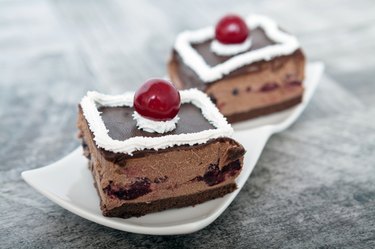
Alfred Bird discovered the first modern baking powder when searching for a yeast-free way to make bread for his wife, who suffered allergies to eggs and yeast. Baking powder, like baking soda and yeast, is a leavening agent that causes batter to rise. Baking powder lightens the texture of cakes by enlarging air bubbles within the batter. The correct use of baking powder makes the difference between a light and fluffy cake and a chocolate brick.
Action
Video of the Day
A simple procedure used to test freshness illustrates the importance of baking powder's leavening action. Mix a teaspoon of baking powder into a cup of hot water. Fresh baking powder will immediately bubble vigorously. Baking powder creates carbon dioxide air bubbles. Baking powder also enlarges and enhances air bubbles you create when you cream ingredients for your cake.
Video of the Day
Other Leavening Agents
Baking powder has different, beneficial properties for cake backing that other types of leavening agents don't have. Yeast produces the same rising action, but takes two to three hours to produce bubbles. Baking powder reacts with water, whereas baking soda requires the use of a liquid acid such as buttermilk or yogurt to instigate leavening. Baking soda reacts immediately with liquid, requiring you to bake your cake right away. Baking soda also reacts with cocoa when baked to produce a reddish color, desirable only in devil's food cake.
Ingredients
The secret behind baking powder is its ingredients. Baking powder consists of baking soda, one or more acid salts and cornstarch. The cornstarch absorbs moisture to prevent a reaction until you add liquid. Baking soda neutralizes acids, adds tenderness and helps with leavening.
Double Acting
Double acting baking powder is easier for baking cakes because it lengthens the amount of time you have between mixing the batter and baking it in your oven. You may delay baking 15 to 20 minutes after mixing your batter when you use double acting baking powder, according to the Joy of Baking. The first action occurs when you add liquid to the dry ingredients containing baking powder when one of the acid salts, like cream of tartar or sodium aluminum sulfate, reacts with the baking soda. Oven heat expands air bubbles in the second action, making your cake rise even more in the oven.
Considerations
Too much baking powder makes your cake taste bitter. Excessive baking powder causes your cake to rise too rapidly and then collapse due to the air bubbles growing too large. Too little baking powder results in a tough cake with compact crumbs and poor volume.